-
November 22, 2006 - COMMENTARY
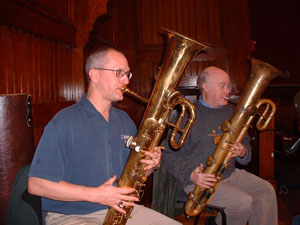 On November 22, 2007, Boston's Handel & Haydn Society, conducted by Jeffrey Rink, gave the first period instrument performance in
North America of the finale (fifth movement) of Berlioz's "Sinfonie Fantastique." The concert, at Harvard University's Sanders Theater, was
part of the Harvard course, "First Nights: Five Performance Premieres," led by Dr. Thomas Forrest Kelly. Taking the form of a lecture/recital,
Kelly brought the audience into Berlioz's sound, cultural and political world through spoken commentary and excerpts from the "Sinfonie" played
by the orchestra. Specially constructed tubular bells (at pitch A=430) were on hand and the audience was asked to vote on whether they preferred
the sound of the bells or that of two pianos which Berlioz suggested as a viable alternative to bells (the bells won in a lopsided vote).
The class concluded with a run-through of the entire movement.
On November 22, 2007, Boston's Handel & Haydn Society, conducted by Jeffrey Rink, gave the first period instrument performance in
North America of the finale (fifth movement) of Berlioz's "Sinfonie Fantastique." The concert, at Harvard University's Sanders Theater, was
part of the Harvard course, "First Nights: Five Performance Premieres," led by Dr. Thomas Forrest Kelly. Taking the form of a lecture/recital,
Kelly brought the audience into Berlioz's sound, cultural and political world through spoken commentary and excerpts from the "Sinfonie" played
by the orchestra. Specially constructed tubular bells (at pitch A=430) were on hand and the audience was asked to vote on whether they preferred
the sound of the bells or that of two pianos which Berlioz suggested as a viable alternative to bells (the bells won in a lopsided vote).
The class concluded with a run-through of the entire movement.
Jay Krush (of the Chestnut Brass Company) and I played ophicleide in the performance and I also played serpent in the opening statements of
the "Dies irae," following Berlioz's original intentions. During Kelly's lecture, I also came to the apron of the stage where I spoke a bit
on the history of the serpent and then played the "Dies irae" on serpent with a group of six male singers from Harvard, simulating performance
in a French church of the time. I played his Monk Workshop serpent (1996, London, walnut, 1 key) and Roehn ophicleide (c. 1855, Paris, in C,
9 keys) and Jay played his Butler and Son ophicleide (c. 1860, Soho, London, in C, 11 keys). It was a great pleasure to work once again with
Jay Krush, a tremendous person and musician, and to hear this movement of Berlioz's "Sinfonie" with period instruments (I had previously played
the fourth movement of the "Sinfonie" for the same class at Harvard in 2002) was enlightening.
-
October 23, 2006 - NEW
On June 10, 2006, I gave the
graduation address at the Caritas Academy of Arts and Sciences.
Titled "Hold On To Hope,"
it explores the theme of hope as we confront the challenges the world throws at us.
-
October 22, 2006 - NEW
 In 1906, the members of the Boston Symphony Orchestra Trombone Quartet (Carl Hampe, principal, August Mausebach, second,
Leroy Kenfield, bass, and another as yet unidentified player) traveled to the recording studios of the Victor Talking
Machine Company and recorded three pieces: "The Kerry Dance," "Annie Laurie," and "Nearer, My God, to Thee." "Annie Laurie"
was never released but the other two tracks enjoyed a long life in the Victor catalog.
In 1906, the members of the Boston Symphony Orchestra Trombone Quartet (Carl Hampe, principal, August Mausebach, second,
Leroy Kenfield, bass, and another as yet unidentified player) traveled to the recording studios of the Victor Talking
Machine Company and recorded three pieces: "The Kerry Dance," "Annie Laurie," and "Nearer, My God, to Thee." "Annie Laurie"
was never released but the other two tracks enjoyed a long life in the Victor catalog.
Trombonist Howard Knapp obtained copies of these recordings and when I was made aware of them, we learned that they are the
earliest known recordings by any group of players from the Boston Symphony Orchestra. These historical recordings caught the
attention of both the Boston Globe newspaper and Boston radio station WGBH. On October 21, the Boston Globe ran a
lengthy story about the recordings by Geoff Edgers on page one of its "Living/Arts" section and on October 22, I
was interviewed on WGBH radio when host Ron della Chiesa and I discussed the recordings and the players and the
recordings were aired, perhaps for the first time. All of this coincided nicely with the 125th anniversary of the
Boston Symphony which gave its first concert on October 22, 1881.
I have written a new article about these recordings,
The Boston Symphony Orchestra Trombone Quartet: The 1906 Victor Recordings which
includes many photos, archival documents from the Boston Symphony and BMG (Victor) archives, commentary and mp3
files of these important recordings. Research is ongoing and I expect to be updating this article from time to time
as we learn more about the recordings and the players who were part of making history as a result.
-
August 19, 2006 - UPDATE
Updated schedule page.
-
July 29, 2006 - NEW
In recent months I have been giving a great deal of thoughts to the Internet and email and how these technologies have changed our culture.
This new article, What Happened to the Internet?, is an expansion of these thoughts and a
discussion of how they are
leading me to make significant changes in my life.
-
July 13, 2006 - UPDATE
Updated schedule page.
-
June 10, 2006 - UPDATE
Updated schedule page.
-
May 25, 2006 - NEW
I have added photos of "The Henry Wadsworth Longfellow Memorial," by Daniel Chester French, located
at Longfellow Park, Cambridge, Massachusetts.
-
April 17, 2006 - UPDATE
Updated trombone humor page with a fantastic new parody
by David C. Fletcher on Salvador Dali's "The
Persistence of Memory" which he has titled, "The Persistence of Trombones."
-
April 2, 2006 - COMMENTARY
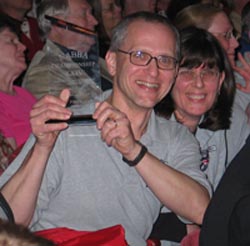

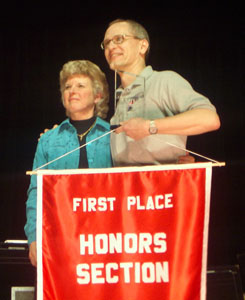 Yesterday the
New England Brass Band
(NEBB), of which I am music director, competed at the 24th North American Brass Band Championships held on the campus of Indiana Unviersity Southeast in
New Albany, Indiana (across the river from Louisville, Kentucky). Sponsored by the
North American Brass Band Association, this year's contest was the fourth time the NEBB had particpated. In 2004, the NEBB took first place
in the "Challenge" section at NABBA XXII (see my commentary below for April 17, 2004, for my thoughts on that contest victory). This year, the band decided to move up to the "Honors" section which meant being in a more competitive section and having to play significantly
more difficult music. The test piece for the Honors section this year was Gilbert Vinter's "Spectrum" and we played Philip Sparke's "The Year of the Dragon" to fill out our contest program.
At the awards ceremony after the contest, we were thrilled to have our band announced as the winner of the Honors section. Running up to the stage to accept the trophy (the photo at
left shows my wife and me with the first place trophy) and banner (the photo at right shows me accepting the banner and trophy which was presented by NABBA President Anita
Cocker Hunt) was an unforgettable moment - looking out at our band members who were standing and cheering I could only think what a privilege it is to work
each week with such a talented and committed group of people. Brass banding, to me, represents the best of the amateur music world. Players getting together not for money but simply
to make music together. The NABBA contest is a special way for us to interact with people in other bands from around the country and to spend more time with our own band members as
we eat meals, travel and play together. Our hosts at Indiana University Southeast organized an excellent weekend which included a solo and small ensemble contest as well. NEBB Eflat
bass player Mark Fabulich won third place in the Adult Low Instrument Slow Melody solo contest and the band's flugelhorn player, Kevin Maloney, won third place in the Adult High
Instrument Slow Melody solo contest. In all it was a special weekend for all of us in the New England Brass Band and one which found the band growing musically and inter-personally.
Full results of the contest can be found on the
NABBA Music Resources Website and a full report about the contest can be found on the website of
4BarsRest.com.
Yesterday the
New England Brass Band
(NEBB), of which I am music director, competed at the 24th North American Brass Band Championships held on the campus of Indiana Unviersity Southeast in
New Albany, Indiana (across the river from Louisville, Kentucky). Sponsored by the
North American Brass Band Association, this year's contest was the fourth time the NEBB had particpated. In 2004, the NEBB took first place
in the "Challenge" section at NABBA XXII (see my commentary below for April 17, 2004, for my thoughts on that contest victory). This year, the band decided to move up to the "Honors" section which meant being in a more competitive section and having to play significantly
more difficult music. The test piece for the Honors section this year was Gilbert Vinter's "Spectrum" and we played Philip Sparke's "The Year of the Dragon" to fill out our contest program.
At the awards ceremony after the contest, we were thrilled to have our band announced as the winner of the Honors section. Running up to the stage to accept the trophy (the photo at
left shows my wife and me with the first place trophy) and banner (the photo at right shows me accepting the banner and trophy which was presented by NABBA President Anita
Cocker Hunt) was an unforgettable moment - looking out at our band members who were standing and cheering I could only think what a privilege it is to work
each week with such a talented and committed group of people. Brass banding, to me, represents the best of the amateur music world. Players getting together not for money but simply
to make music together. The NABBA contest is a special way for us to interact with people in other bands from around the country and to spend more time with our own band members as
we eat meals, travel and play together. Our hosts at Indiana University Southeast organized an excellent weekend which included a solo and small ensemble contest as well. NEBB Eflat
bass player Mark Fabulich won third place in the Adult Low Instrument Slow Melody solo contest and the band's flugelhorn player, Kevin Maloney, won third place in the Adult High
Instrument Slow Melody solo contest. In all it was a special weekend for all of us in the New England Brass Band and one which found the band growing musically and inter-personally.
Full results of the contest can be found on the
NABBA Music Resources Website and a full report about the contest can be found on the website of
4BarsRest.com.
To the members of the NEBB I am happy to say, once again, how proud I am of all of you and how fortunate I am to be the leader of a band full of such high quality individuals.
-
March 19, 2006 - NEW
 Brass Band Aid is an exciting partnership between brass bands worldwide which are working together with World Vision to construct and equip
a school in Adet, Ethopia. It has been inspiring to watch the progress of this noble effort as brass bands around the world, spearheaded by the Stanhope Band in England, have found
creative ways to engage audiences in rasing funds for the project. Recently, the board of directors of the New England Brass Band (of which I am music director) has voted to make a significant contribution to
Brass Band during the bands 2006-07 season. My wife and I are also making a personal donation to this effort. I have created a
new page on my website detailing the New England Brass Band's commitment to Brass Band Aid. Also provided are links to the Brass Band Aid website where more detailed information
about the Adet, Ethiopia project, the Brass Band Aid CD and how to make a donation to Brass Band Aid can be found. I hope many visitors to my website will learn more about Brass Band
Aid and consider ways they can become involved in this important charitable work.
Brass Band Aid is an exciting partnership between brass bands worldwide which are working together with World Vision to construct and equip
a school in Adet, Ethopia. It has been inspiring to watch the progress of this noble effort as brass bands around the world, spearheaded by the Stanhope Band in England, have found
creative ways to engage audiences in rasing funds for the project. Recently, the board of directors of the New England Brass Band (of which I am music director) has voted to make a significant contribution to
Brass Band during the bands 2006-07 season. My wife and I are also making a personal donation to this effort. I have created a
new page on my website detailing the New England Brass Band's commitment to Brass Band Aid. Also provided are links to the Brass Band Aid website where more detailed information
about the Adet, Ethiopia project, the Brass Band Aid CD and how to make a donation to Brass Band Aid can be found. I hope many visitors to my website will learn more about Brass Band
Aid and consider ways they can become involved in this important charitable work.
-
March 17, 2006 - EXHIBIT ANNOUNCEMENT
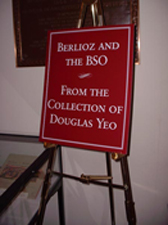
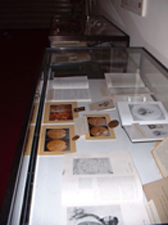
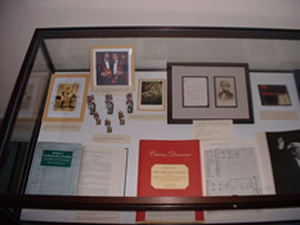 Reprinted from the Boston Symphony Orchestra Program Book, March 15 - May 6, 2006.
Reprinted from the Boston Symphony Orchestra Program Book, March 15 - May 6, 2006.
Celebrating Berlioz: A Special Display at Symphony Hall, Boston.
No single composer has been more closely identified with the Boston Symphony Orchestra than Hector Berlioz (1803-1869). Championed here in the past half-century particularly by Charles
Munch and Seiji Ozawa, Berlioz's music continues to figure prominently in the BSO's programming under James Levine, who led Berlioz's "Le Corsaire" Overture and "Symphonie fantastique"
earlier this season and has scheduled "La Damnation de Faust" for 2006-07. This April, guest conductor Rafael Frubeck de Burgos leads the composer's monumental Requiem. BSO bass trombonist
Douglas Yeo, a great admirer of Berlioz who has played trombone, serpent and ophicleide in Berlioz performances with the BSO and a number of period-instrument orchestras, has an extensive
collection of Berlioz memorabilia, books, and facsimile scores. The display cases in the Massachusetts Avenue corridor of Symphony Hall include a selection of items from Mr. Yeo's collection,
among them an original letter by Berlioz, commemorative medals struck for the Berlioz centennial in 1903, and photographs of the composer, as well as various facsimile scores that afford insight
into Berlioz's compositional process. The exhibit runs from March 15 - May 6, 2006.
-
March 9, 2006 - LINK
Among the many gifted and talented students I have had the privilege to teach is Matthew Guilford, bass trombonist of the National Symphony Orchestra in Washington D.C. Matt
was my first student at New England Conservatory of Music in Boston when I joined the Boston Symphony in 1985. Several weeks ago he asked if he could interview me and include that
interview on his website. I agreed and subsequently found his questions to be very thought provoking which led to my thinking very deeply about my answers. The interview is now online
on Matt's website, which can be found at matthewguilford.com.
-
February 12, 2006 - COMMENTARY
 Last week I travelled to Texas for a week long masterclass tour of five universities. I have given hundreds of similar classes over the years in schools around the world but this
trip to Texas was particularly rewarding for me in many ways. Dennis Bubert, bass trombonist of the Fort Worth Symphony and professor of trombone at University of Texas Arlington
organized the trip for me which was several years in the planning. I appreciate, too, Yamaha's sponsorship of several of the classes.
Thanks to the Boston Symphony Orchestra scheduling a week of all-Beethoven concerts, I was able to get down
to Texas for five days where I was hosted at five schools by tremendously gifted trombone professors. Dennis Bubert, Nathaniel Brickens (University of Texas Austin), Henry
Howey (Sam Houston State), Brian Kauk (University of Houston) and Wayne Dyess (Lamar University) all were gracious hosts who preside over studios of gifted, interested
and interesting trombonists. The classes at each school showed each group of players to be unique in many ways but bound together with a common purpose to bring
excellence to music making. It was also gratifying to find many high school students, music teachers and parents in the audiences as we journeyed together by talking, playing, and
interacting. In Arlington, I was pleased to find several former students who had studied with me at New England Conservatory in the audience. My drivers, Dennis Bubert,
Brian Kauk and David Ford (of Music & Arts Centers in Houston) provided me with many hours of interesting and stimulating conversation as we navigated the considerable distances we had
to travel over east Texas. I find it especially gratifying to meet people with whom I have interacted over the years through the Internet, either by email or through the Online
Trombone Journal Forum or the basstrombone.nl forum. On this trip I was able to put many names with faces and voices, and meeting Wayne Dyess (who had helped me by mastering
old tapes and LP cuts for my CD "Take 1") was a special pleasure. I came home to Boston with many thoughts and memories of young trombone players, fine food (barbeque, Mexican and
Cajun cuisine - the fried alligator in Beaumont, steak in Fort Worth and Mexican style talapia in Huntsville were especially memorable - as was the home town barbeque in Huntsville
where the restaurant's motto was, "Our beans speak for themselves...") and a new pair of cowboy boots. Leaving the balmy temperatures of Texas to be confronted with a major
blizzard (18 inches of snow has arrived today in Boston) is quite a contrast. To all who made my trip such a success (including my younger brother, Greg, and his wife who
I got to see during the week), I offer my profound thanks. And to the students I worked with
and who were in the audiences, keep the standard in mind as you strive for excellence. Sempre avanti!
Last week I travelled to Texas for a week long masterclass tour of five universities. I have given hundreds of similar classes over the years in schools around the world but this
trip to Texas was particularly rewarding for me in many ways. Dennis Bubert, bass trombonist of the Fort Worth Symphony and professor of trombone at University of Texas Arlington
organized the trip for me which was several years in the planning. I appreciate, too, Yamaha's sponsorship of several of the classes.
Thanks to the Boston Symphony Orchestra scheduling a week of all-Beethoven concerts, I was able to get down
to Texas for five days where I was hosted at five schools by tremendously gifted trombone professors. Dennis Bubert, Nathaniel Brickens (University of Texas Austin), Henry
Howey (Sam Houston State), Brian Kauk (University of Houston) and Wayne Dyess (Lamar University) all were gracious hosts who preside over studios of gifted, interested
and interesting trombonists. The classes at each school showed each group of players to be unique in many ways but bound together with a common purpose to bring
excellence to music making. It was also gratifying to find many high school students, music teachers and parents in the audiences as we journeyed together by talking, playing, and
interacting. In Arlington, I was pleased to find several former students who had studied with me at New England Conservatory in the audience. My drivers, Dennis Bubert,
Brian Kauk and David Ford (of Music & Arts Centers in Houston) provided me with many hours of interesting and stimulating conversation as we navigated the considerable distances we had
to travel over east Texas. I find it especially gratifying to meet people with whom I have interacted over the years through the Internet, either by email or through the Online
Trombone Journal Forum or the basstrombone.nl forum. On this trip I was able to put many names with faces and voices, and meeting Wayne Dyess (who had helped me by mastering
old tapes and LP cuts for my CD "Take 1") was a special pleasure. I came home to Boston with many thoughts and memories of young trombone players, fine food (barbeque, Mexican and
Cajun cuisine - the fried alligator in Beaumont, steak in Fort Worth and Mexican style talapia in Huntsville were especially memorable - as was the home town barbeque in Huntsville
where the restaurant's motto was, "Our beans speak for themselves...") and a new pair of cowboy boots. Leaving the balmy temperatures of Texas to be confronted with a major
blizzard (18 inches of snow has arrived today in Boston) is quite a contrast. To all who made my trip such a success (including my younger brother, Greg, and his wife who
I got to see during the week), I offer my profound thanks. And to the students I worked with
and who were in the audiences, keep the standard in mind as you strive for excellence. Sempre avanti!
-
January 31, 2006 - NEW
Added a new page detailing the history of yeodoug.com in
celebration of the 10th birthday of my website on February 12, 2006.
-
January 26, 2006 - UPDATE
Updated schedule page with more information about my masterclasses in Texas in February and in Louisville, Kentucky, in March.
-
January 13, 2006 - NEW
Added a new page, P.D.Q. Bach and the American Serpent Players with photos and commentary about three concerts
I played in New York City with the American Serpent Players and Professor Peter Schickele. At these concerts ASP performed P.D.Q. Bach's round, "O, Serpent" as part
of Schickele's "40 Year Retrogressive" of the music of P.D.Q. Bach.
-
January 11, 2006 - UPDATE
Updated my Trombones and related instruments gallery page with a photo of August Helleberg holding
his Conn BBflat contrabass trombone which I now have in my collection and an additional photo of Edward Williams, bass trombonist of the Sousa Band who played
the same model Conn "New Invention" bass trombone that I now have.
-
January 3, 2006 - UPDATE
Updated Serpentists at Amiens Cathedral (France) with new scans and commentary of Charles Wild's
c.1826 engraving/aquatint that has major implications on how we view ecclesiastical musicin France in the early 19th century. Also updated my
schedule page with information about my planned master class tour of Texas to take place in February.